Help people take control of their health and wellness as a doctor, nurse, dentist, physician assistant or physical therapist. Provide compassionate care to animals as a veterinarian.
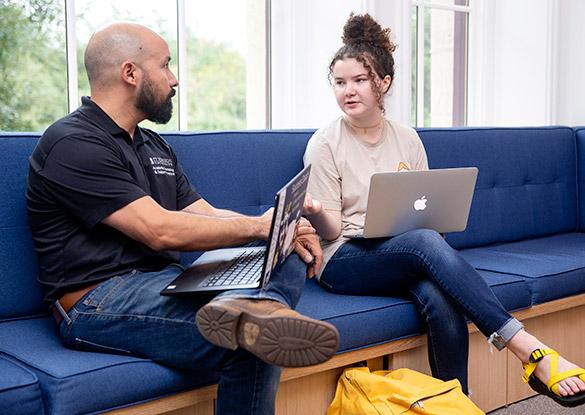
Major Roadmap
Explore your options — classes, internships, research and study abroad. Utilize the Biology BS Major Guide or Biology BA Major Guide to find what interests you, discover what you love, and create a major experience that jumpstarts your future.
Educate the next generation as a science teacher. Conduct valuable research that advances our understanding of the natural environment and the development of lifesaving drugs.
As a Biology major, you’ll learn the fundamental principles of biology at work in genes, cells, organ systems and even ecosystems. Then direct your studies toward a career in the health professions, research, industry, public health or teaching. Choose from courses in molecular biology, cellular biology, developmental biology, microbiology, neurobiology, zoology, botany, ecology or other fields.
Conduct research using state-of-the-art equipment and light-filled labs in the John Brooks Williams Natural Sciences Center — or the Ashe juniper-covered hills of Wild Basin Creative Research Center in West Austin, a nature preserve managed by St. Edward’s. And present your discoveries at academic conferences, where you’ll network with other scientists and connect with even more opportunities.
What do our graduates do?
Biology majors go on to a variety of careers and graduate schools from St. Edward’s. Here’s a sample.
- Scientist at AstraZeneca, after earning a PhD from the University of Illinois at Chicago
- Data scientist at St. David’s HealthCare, after earning a Master of Public Health from Yale University
- Senior digital strategy consultant for Health, Life Science and Fitness at Ernst & Young
- Director of the Americas at the U.S. Department of Health and Human Services’ Office of Global Affairs
- Consulting analyst at the global consulting firm Accenture
- Regulatory affairs specialist at Becton, Dickinson and Co.
- Graduate students at the University of Notre Dame, The University of Texas at Austin, Texas A&M University, Saint Louis University, DePaul University, Wake Forest University and the University of California Davis
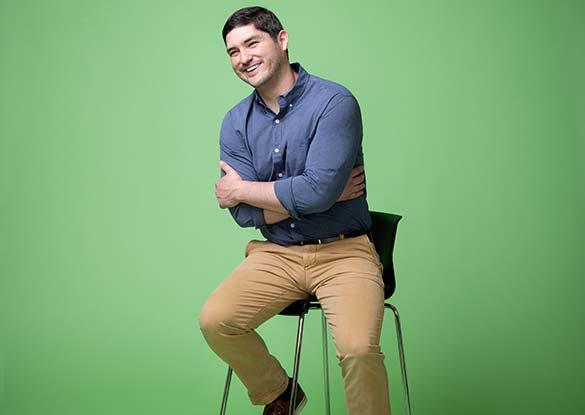
Alumni Go Full On
Professors and research made the difference for Biology major Leon A. Venegas ’10. Read how he took what he learned at St. Edward’s to become a scientist at AstraZeneca in Washington, D.C.
The Classroom and Beyond
Whether you plan to enter a career in research, medicine, health education, clinical laboratory science or science journalism, you’ll find opportunities outside the classroom to learn, give back, and prepare for your future with your fellow Biology majors.
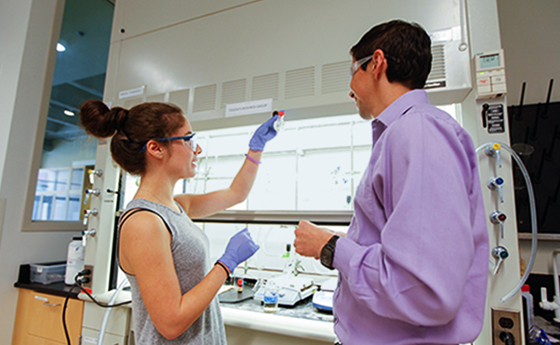
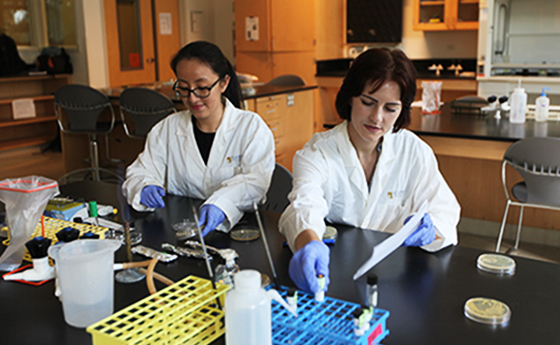
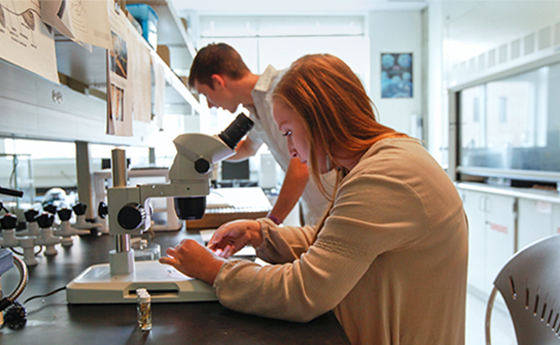
Experiential Education
In Entomology, which focuses on studying the evolutionary adaptations and incredible biodiversity found among insect groups, you’ll learn how to collect, preserve, and identify insects in the field.
Students in the Introductory Biology labs have collected water samples from Bee Creek, at Wild Basin Creative Research Center, to analyze levels of nutrients like nitrates and phosphorus.
In Cell Biology, you’ll work in groups on a semester-long project to collect and analyze your own data to address a complex research question. You’ll have the advantage of using the Fluoview FV3000 laser scanning confocal microscope, a state-of-the-art $200,000 piece of equipment the university recently purchased with a National Science Foundation Major Research Instrumentation Grant. The final project is a scientific seminar in which you’ll present the results of your work to an audience of faculty from the department.
If you are planning to enter a health profession, you’ll take the First-Year Seminar in Pre-Health Professions your freshman year. This course gives you insight into what life is really like as a doctor, physician’s assistant, or other healthcare practitioner. Local professionals visit the class to share their day-to-day responsibilities, how they handled the college years, and their approach to work-life balance. You’ll conduct an informational interview with someone in your field and possibly job-shadow that person.
If you’re on the health professions track, as a junior or senior you’ll take Navigating the Health Application Process. In this class, you’ll choose the schools where you want to apply, put your application together and write your personal statement.
SEU to You
Associate Professor of Biology Lisa Goering talks about her General Biology I course.
3 Biology Tracks and Degree Requirements
General Education Requirements: In addition to the major program requirements, all students must satisfy the general education requirements. Talk with your success coach and faculty advisor about which courses are right for you.
1. Bachelor of Arts in Biology
- Primarily designed for students pursuing a double major, biology education certification, or admission to professional schools
- Provides a solid foundation in biology with more latitude in the choice of general electives
- An example of a course you will take is Molecular Genetics which offers a study of the structure and function of DNA as the genetic material and focuses on details surrounding the “central dogma of molecular biology,” including DNA replication, transcription, RNA processing and translation, as well as mechanisms of control and regulation of expression of genetic information.
General Biology Track
- View or download the full BA in Biology - General Biology degree plan (PDF)
Biology Education Track
- View or download the full BA in Biology - Biology Education degree plan (PDF)
Pre-Nursing Track
- View or download the full BA in Biology - Pre-Nursing degree plan (PDF)
Allied Health Track
- View or download the full BA in Biology - Allied Health degree plan (PDF)
BA in Biology + MS in Clinical Laboratory Science (3 + 2) Program
- Earn two degrees in five years: a Bachelor of Arts in Biology from St. Edward’s University, and a Master of Science (MS) in Clinical Laboratory Science (CLS) from UTMB.
- View or download the full 3+2 Program degree plan (PDF)
2. Bachelor of Science in Biology
Health Professions Track
- Designed for students who intend to pursue further education and a career in the health professions such as medicine, veterinary medicine, physician assistant, dentistry, physical therapy, public health or nursing
- Degree requirements include the prerequisites for most professional schools
- An example of a course you will take is Evolution, an in-depth analysis of evolution via natural selection using examples from all major classes of organisms. Emphasis is placed on the mechanism and resulting products of evolutionary change. Evolutionary change is examined at the molecular, organismal and population levels of organization.
- View or download the full BS in Biology - Health Professions degree plan (PDF)
Graduate School Track
- Designed to provide a strong background in biology and research and prepare students for graduate school
- Prepares students for education at the graduate level leading to careers outside the health professions. Students might study molecular biology, cellular biology, developmental biology, microbiology, neurobiology, zoology, botany, ecology or other fields
- An example of a course you will take is Population Biology and Ecology wherein students study the abundance and distribution of populations and collect and analyze data in experiments designed to test the theories presented in lecture. These include studies of distribution patterns, foraging behavior, and population and community structure.
- View or download the full BS in Biology - Graduate School major degree plan (PDF)
3. Bachelor of Science in Medical Laboratory Science
- Prepares students to be health care detectives, investigating the cause of infectious disease, cancer and other ailments
- Involves coursework at St. Edward's University and clinical training at an affiliated MLS program (currently Austin State Hospital and Baylor Scott & White). These courses span disciplines such as microbiology, hematology, immunology, clinical chemistry and molecular biology.
- An example of a course you will take is Immunology where students will discover the molecular nature of the human immune system including the cellular and noncellular components involved and how these factors interact to combat disease.
- View or download the full BS in Medical Laboratory Science degree plan (PDF)
Interested in earning a Master of Science in Clinical Laboratory Science? Learn more about our dual degree program.
Research
Biology majors at St. Edward’s have the opportunity to work on research with their professors over the summer and during the school year. By working on projects with faculty, you’ll learn about the process of research and develop your lab skills. Students often emerge from these projects with publishable research.
Students have worked with professors studying the roundworm C. elegans, which is often used as a model organism, to study the process of autophagy, an organism’s waste-removal system, and to study neurological development.
Biology majors have worked alongside their professor on a research project that examines how moving a colony affects honeybees’ stress response and ability to fight off infection. They helped maintain two colonies of bees on campus and analyzed the immune systems of bees they collected from the hives. One student also studied how exposure to commonly used pesticides affect bees’ immune systems.
Students have presented their research and won awards at conferences including
- Society for Neuroscience
- Texas Academy of Science
- The Society for the Advancement of Chicanos and Native Americans in Science National Diversity in STEM Conference.
- McNair Scholars Research Conferences
- Annual Biomedical Research Conference for Minority Students
- TriBeta Biological Society Regional Research Conference
Biology majors have also been selected for competitive Research Experiences for Undergraduates and for the LIVESTRONG Cancer Institutes’ Summer Undergraduate Research Fellowship at The University of Texas at Austin and Dell Medical School.
Wild Basin Creative Research Center is 227-acre wilderness preserve located in West Austin and managed by St. Edward’s in coordination with local government entities. The preserve offers opportunities to study the natural world in a beautiful setting. Students have worked on environmental research projects at Wild Basin that include using motion-triggered wildlife cameras to document species diversity; measuring water quality in Bee Creek; documenting the bird species that live and the preserve and recording their songs to see how they change in the presence of human activity; and analyzing the microbial communities in soil around the preserve.
Student Organizations
The St. Edward’s chapter of the Texas Academy of Science supports student research, including presentation and publication opportunities. Members also tutor in the sciences and complete other service projects.
Students with strong academic achievement in the sciences are eligible to join the St. Edward’s chapter of Beta Beta Beta, the National Biological Honor Society.
Students for Sustainability educates the St. Edward’s community about eco-friendly practices and works with the St. Edward’s administration to implement environmental initiatives. Members help maintain the campus garden, learn about biking and public transportation, encourage fellow students to reduce their use of plastic water bottles, and have clothing swaps and upcycled craft nights.
The American Medical Student Association matches freshmen with upperclassman mentors in the same major. Together, members learn from guest speakers – like physicians and Peace Corps Volunteers – and complete volunteer projects.
GlobeMed explores topics related to global health, equity, sustainability and social justice. The organization partners with Asociación Tierra in Nicaragua, which focuses on sustainable nutrition, clean water, education and employment. The St. Edward’s GlobeMed chapter has chosen a project that runs an after-school activity and sustainable nutrition program for children in need. Summer interns travel to Nicaragua to work on projects led by the local partners.
The Hilltop Health Association builds community among pre-health students through service, promoting a healthy lifestyle, learning opportunities focused on global health, and service in clinical settings.
Pre-health students participate in the Making Equity Standard in Healthcare (MESH) mentorship day at Dell Medical School in Austin. In this program, current medical students advise undergraduates, particularly those from underrepresented backgrounds, about how to become stronger candidates for medical school. The Saturday program includes a tour of the school, information about the medical school’s distinctive curriculum and its work with the Austin community, and a Q&A with students.
Pre-health professions students can take advantage of 30 annual events sponsored by the health professions office. These include on-campus meetings with representatives from graduate programs as well as workshops to prepare you for specific aspects of the application process. Plus, St. Edward’s organizes small-group visits to medical, nursing and physical therapy schools.
Health sciences schools appreciate applicants who are curious and willing to get out of their comfort zones. St. Edward’s offers many opportunities to volunteer with a broad variety of people and learn about the social forces that influence health and access to medicine. These include:
- S.E.R.V.E Austin is a weekly, semester-long volunteer commitment at a specific site where you’ll develop relationships with immigrants and refugees, children at an after-school program, young adults working on their GED, the elderly or the formerly homeless.
- S.E.R.V.E. 1 Day events are Saturday-morning programs that include breakfast, transportation to the site, lunch and a reflection. These one-day projects often involve physical labor, like cleaning up a park, removing invasive species or painting a school.
- Service Break Experiences give you the chance to travel to another community, volunteer and learn about local life. SBEs are built on ongoing relationships between St. Edward’s and the service location and require students to prepare – educationally and spiritually – for several months beforehand. The trips incorporate structured reflections so you’ll integrate what you’ve learned and use it to fuel your charity and justice work going forward. A hallmark of SBEs is their emphasis on living simply – you’ll leave your phone and other luxuries behind.
Internships
Pre-health professions students often shadow doctors or volunteer at local hospitals. In addition, Biology majors have completed internships focused on environmental stewardship, clinical health, animal behavior, and medical and pharmaceutical research at the following organizations:
- CD Doyle Clinic, a free clinic run by Dell Medical School students in downtown Austin
- Regarding Cancer, which provides free support services to anyone affected by cancer
- San Antonio Zoo
- Asuragen, which develops diagnostic tests for people with cancer and genetic diseases
- U.S. Department of Agriculture
- The University of Texas MD Anderson Cancer Center in Houston
- Macromoltek, a computational drug discovery company dedicated to the advancement of antibody drug development
- The Nature Conservancy
As a student in the Biology program you are afforded access to the funding programs, including paid internships, offered exclusively to STEM students at St. Edward’s University by the Institute for Interdisciplinary Science (i4). For more information on these programs please visit the Institute for Interdisciplinary Science (i4).
Our Faculty
Faculty members are teacher-scholars with years of academic experience and creative passions of their own. They stay active in their fields and bring their expertise to the classroom.

“Being a professor allows me to integrate two things that I love - teaching and research. In this setting, I have the opportunity to work closely with students and mentor them as they put what they’ve learned in class to use. Seeing students get inspired by the science, and in turn inspiring me to be a better teacher and scientist is a very rewarding process!
– Lisa M. Goering, PhD
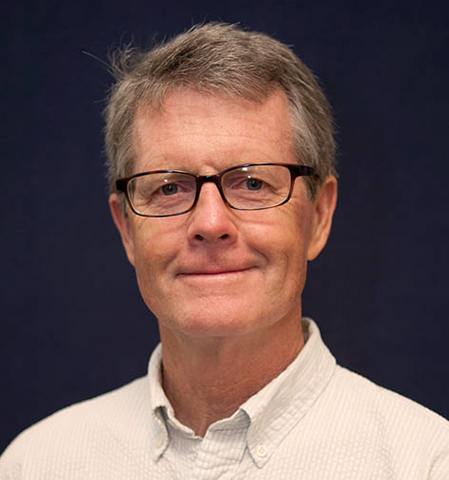
“Over the years, I’ve learned that giving students direct, quick feedback and close one-on-one support works best for heading off frustration and keeping students engaged. I don’t tell them what to do or how. I remind them that this is real science, so often times, I don’t know what’s going to happen either.”
– Bill Quinn, PhD
Biology Minor
A minor in Biology, allows students to explore an interest in biological sciences, while providing them with opportunities to develop skills in scientific reasoning and literacy. A student, in consultation with a Biological Sciences faculty member, develops a customized group of elective courses to complete the minor. A minimum of nine of those elective hours must be from upper-division classes in accordance with university requirements. Total minor hours: 21
Required Courses:
- General Biology I
- General Biology I Lab
- General Biology II
- General Biology II Lab
- Molecular Genetics
- Biology Electives (BIOL 3000+, 10 hrs)
Are you a current student? Contact your advisor for next steps on declaring your major or minor.
Evolutionary Foundation for Curricula
At St. Edward’s University, all curricula in the Biological Sciences are founded upon evolutionary theory. As a subject of scientific inquiry, the theory of evolution provides opportunities for testing of hypotheses that strengthen our understanding of the processes that account for the diversity of life on earth, and existing data overwhelmingly support the theory as scientifically sound. We regard any non-scientific or teleological attempts that distract from the scientific processes that underlie science as, at best, a diversion to our mission to provide exceptional education to our students in the Biological Sciences. We stand with the numerous scientific societies that have issued statements on the subject of evolution and intelligent design, confirming the demonstrated success of the former and rejecting the scientific viability of latter.